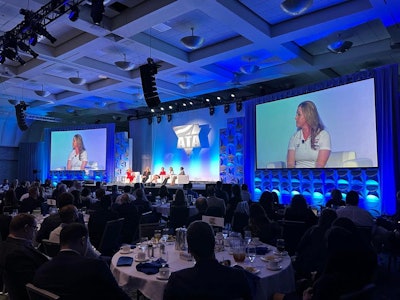
Tamara Jalving’s daughter is at the age where she’s trying to determine her career path, but she isn’t very interested in the trucking industry despite her mother’s leadership role at a transportation company.
Jalving, vice president of safety at Yellow Corp. (CCJ To 250, No. 6), said she is trying to help her daughter see past the perception that trucking is a male’s environment.
Jalving was one of five women leaders in trucking at the American Trucking Associations Management Conference & Exhibition in San Diego this week to discuss ways the industry could help shift that perspective and branch beyond its traditional pool of candidates to not only recruit and retain women but also to empower them to succeed.
“I want to encourage the audience and people here to stop using the term male-dominated when it comes to the trucking industry; let’s expire that term because we’re here,” Cari Baylor, president of Indiana-based Baylor Trucking, said during the panel.
While women have always been part of the industry, they have faced challenges often reserved specifically for their gender – from labor-intensive roles like driving to the executive level.
For Jalving, the biggest challenge has been developing new relationships.
“There have been some struggles coming in at a higher level. This industry, more so than the other industries I’ve worked in, … there are longstanding relationships of people who’ve been in this industry 10, 20, 30 years,” Jalving said. “When you’re coming in, people often have expectations that you must have earned your way there. It’s easy to be dismissed. I did earn my stripes; I just did it in other industries.
In other industries, there is a stronger female leadership population to share those experiences and build those relationships.”
For Tina Peterson, a professional driver and owner of Red Pine Transport, her challenges are related more to gender roles.
“Being a woman, we’re not as strong as men physically; sometimes I have to humble myself and ask for help,” Peterson said. “I feel like sometimes, because it isn’t really normal for a woman to be behind the truck, that people are watching what I’m doing; sometimes that gets uncomfortable, but then I think about the little girls that are watching me do it, or maybe I can inspire a woman to see that women do this.”
Peterson said she has wanted to be a truck driver since she was 7 years old. She achieved that goal and has been a contractor with FedEx Ground for the last nine years, owning a small fleet of trucks.
In a traditionally male workforce, women can find success like Peterson, and it bodes well for transportation companies to bring women on board.
Diversity directly impacts bottom line. The industry cannot afford to leave women out of the equation, especially with such a severe shortage of drivers and diesel technicians, but much of that talent pool is being overlooked.
“Every company wants to make money and be profitable, and really the only way to do that is to understand your consumer base or the end user,” said Angela Tillery, managing director of learning and development at FedEx Freight (No. 1). “Women have tremendous buying power. We’re not only buying for ourselves; we’re influencing the purchasing patterns of our families and friends. So to have that representation at the table when you’re making strategic decisions, when you’re thinking about how to solve business problems and how to reach your consumer base, it’s to your advantage to have some women in your (organization).”
Recruiting and retention
The panel offered several suggestions on how to recruit and retain women.
Studies show that men will apply for a position when they meet 60% of the criteria whereas women will often wait until they meet 100% of the criteria before applying, said panel moderator Shannon Newton, president of the Arkansas Trucking Association.
Jalving said companies need to look at their job descriptions, which could be limiting the talent it could attract.
“That sounds really simple, but what I’ve found – and what we’re trying to do differently – is many of our job descriptions are written to where you have to have so many years of experience in the trucking industry,” she said. “Maybe move those from minimum requirements to preferred requirements; maybe you don’t have to have that experience, but you do have to have competencies, demonstrated skills … that are transferrable to the trucking industry.”
She said companies should also consider creating programs that submerge candidates in operational training. Baylor suggested creating cross-functional teams where women can explore the different career options within the industry without feeling pressured.
Baylor brings students from local schools on site to tour its facilities and demonstrate the spectrum of diversity in trucking.
“It has taken six years, but this is the first year we’ve had women come for our engine class,” Baylor said. “Whether it’s a professional driving career or being in administrating, sales or accounting, showing the spectrum of careers … and doing it young … is important.”
Jalving said women need to be able to envision themselves in these roles.
To help with that, in addition to marketing and advocating for women, Yellow hires women instructors and safety trainers so onboarding women are more comfortable, she said.
Ultimate empowerment
White recruiting women to the industry is a goal for many transportation companies, the panel stressed the importance of empowering women in order to retain them.
What does that look like? Access and execution, Tillery said.
“Access: you have to have people who are invested in you, who see your potential, who see your talent and strengths to open up different opportunities for you, but that’s nothing if you don’t take the initiative and execute against it,” she said.
Newton said in order to truly level the playing field, the industry needs more male advocates to help provide that access.
And to be an advocate, men need to realize the unconscious bias that still exists, Jalving said.
“I used to say that business decisions are made on the golf course; today, they’re made at the table but a table we’re often not at … and we get excluded from those conversations – and not always intentional; it’s unconscious,” she said.
But change in that regard is hopeful, Tillery said, as the next generation has a different mindset and approach.
“I will ask the generations behind us to lean into the generations before them like me and the Baby Boomers because there was so much trailblazing and pioneering that happened, and these women have toiled some soil for you, so listen to some of the things these women have to offer.”










